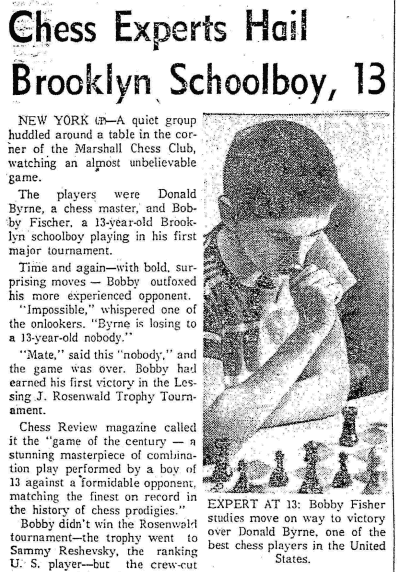Today in History: Bobby Fischer defeats Donald Byrne in the Chess Game of the Century, 1957 (Sports)
As the game progressed, Bobby had only twenty minutes remaining on his clock to make the required 40 moves, and he’d so far completed just 16 of them. And then he saw it: using a deeper insight, he realized that there was an extraordinary possibility that would change the composition of the position and give a whole new meaning to the game. What if he allowed Byrne to capture his queen, the most powerful piece on the board? Normally, playing without a queen is crippling. But what if Byrne, in capturing Bobby’s queen, wound up in a weakened position that left him less able to attack the rest of Bobby’s forces, and less able to protect his own?
The idea for the move grew on Bobby slowly, instinctually at first, without any conscious rationale. It was as though he’d been peering through a narrow lens and the aperture began to widen to take in the entire landscape in a kind of efflorescent illumination. He wasn’t absolutely certain he could see the full consequences of allowing Byrne to take his queen, but he plunged ahead, nevertheless.
If the sacrifice was not accepted, Bobby conjectured, Byrne would be lost; but if he did accept it, he’d also be lost. Whatever Byrne did, he was theoretically defeated, although the game was far from over. A whisper of spectators could be heard: “Impossible! Byrne is losing to a 13-year old nobody.”
Byrne took the queen. Bobby, now so focused that he could hardly hear the growing murmur from the crowd, made his next moves percussively, shooting them out like poison darts, hardly waiting for Byrne’s responses. His chess innocence gone, he could now see the denouement perhaps twenty or more moves ahead. Yet, other than the rapidity with which he was responding to Byrne’s moves, Bobby showed little emotion. Rather, he sat still, placid as a little Buddha, stabbing out one startling move after another.
On the 41st move, after five hours of play, with his heart slightly pounding, Bobby lifted his rook with his trembling right hand, quietly lowered the piece to the board, and said, “Mate!” His friendly opponent stood up, and they shook hands. Both were smiling. Byrne knew that even though he was on the wrong end of the result, he’d lost one of the greatest games ever played, and in so doing had become part of chess history. A few people applauded, much to the annoyance of the players whose games were still in progress and cared not that history had been made just a few feet away. They had their own games to worry about. “Shh! Quiet!” It was midnight.



Comments
Post a Comment